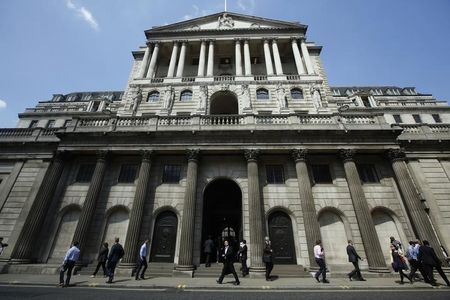By David Milliken
LONDON (Reuters) - Raising interest rates is the Bank of England's last line of defence against asset price bubbles, its chief economist, Andy Haldane, said on Wednesday as British house prices posted their biggest rise in nine years.
Figures out earlier on Wednesday showed that house prices have risen by nearly 12 percent in the past year and are more than 25 percent higher in London - the sharpest increase there since the eve of the 1987 financial crash.
Haldane - speaking at a panel discussion on financial market risks - said some markets might be getting "over-egged".
"As recently as last week, we at the bank took some action overtly with an eye to stop a market – in this case housing – becoming overheated, not today but in future," he said at the event hosted by the Financial Times.
"Equally important is that we've said at the bank that monetary policy can on occasions have a role to play in insuring against these financial stability risks - not as a first line of defence but sometimes as a last line of defence."
Last week, the central bank set limits on how much most Britons can borrow to buy a home and required lenders to undertake more stringent checks that borrowers could cope with higher interest rates.
But BoE Governor Mark Carney said the measures were unlikely to bite until next year, and some economists think rising house prices could add to pressures from a fast-growing economy that might make the central bank raise rates before the year is out.
Haldane said that for now, he saw "precious little sign" of the wage pressures that could prompt the BoE to make an early rate rise. All BoE policymakers think Britain's economy has more scope to grow before rates need to go up from their record-low 0.5 percent, though annualised growth rates above 3 percent mean the slack is disappearing fast.
However, Haldane said the risk of high inflation might be appreciably lower than before.
"There is a chance that we are structurally overestimating inflation and wage pressures in Europe. That's why we are where we are," he said.
British inflation fell to 1.5 percent in May, and the European Central Bank has cut interest rates into negative territory to ward off the risk of deflation.
Haldane also said that big swings in financial market sentiment were now more likely than before the financial crisis, as some risk had transferred away from banks to other investors such as asset managers.

"On average, those fear and greed cycles in financial markets will be more exaggerated than in the past," he said.
Regulators also had to consider whether to broaden their focus on risks from leveraged investments to include those that were not financed by borrowed money, he said.
(Reporting by David Milliken; Editing by Robin Pomeroy, Larry King)
